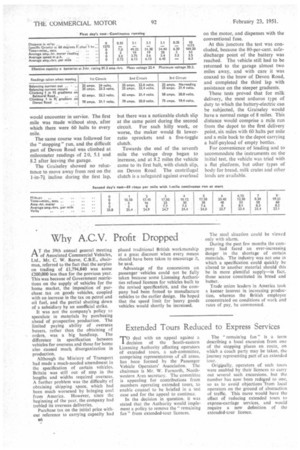Why A.C.V. Profit Dropped
Page 40

If you've noticed an error in this article please click here to report it so we can fix it.
AT the 39th annual general meeting of Associated Commercial Vehicles, Ltd., Mr. C. W. Reeve, C.B.E., chairman, referred to the fact that the surplus on trading of £1,794,840 was some £200,000 less than for the previous year. This was because of Government restrictions on the supply of vehicles for the home market, the imposition of purchase tax on goods vehicles, coupled with an increase in the tax on petrol and oil fuel, and the partial shutting down of a subsidiary by an unofficial strike. It was not the company's policy to speculate in materials by purchasing ahead of prospective production. The limited paying ability of overseas buyers, rather than the obtaining of orders, was a big handicap. The difference in specification between vehicles for overseas and those for horns also caused much disorganization in production. Although the Ministry of Transport had made a much-needed amendment in the specification of certain vehicles. Britain was still out of step in the lengths and widths required overseas. A further problem was the difficulty cf obtaining shipping space, which had been much worsened by bringing coal from America. However, since thc beginning of the year. the company had trebled its overseas deliveries.
Purchase tax on the initial price without reference to carrying capacity had B6 placed traditional British workmanship at a great discount when every means should have been taken to encourage it, he said.
Advantage of the concessions on passenger vehicles could not be fully taken because some Licensing Authorities refused licences for vehicles built to the revised specification, and the company had been forced to manufacture vehicles to the earlier design. He hoped that the speed limit for heavy goods vehicles would shortly be increased.
The steel situation could be viewed only with alarm.
During the past few months the company had faced an ever-increasing danger in the shortage of certain materials. The industry was not one in which a specification could quickly be altered to another material should this be in more plentiful supply-in fact. those scarce constituted its bread and butter.
Trade union leaders in America took a keener interest in increasing production, whereas the British employee concentrated on conditions of work and rates of pay, he commented.




















































































